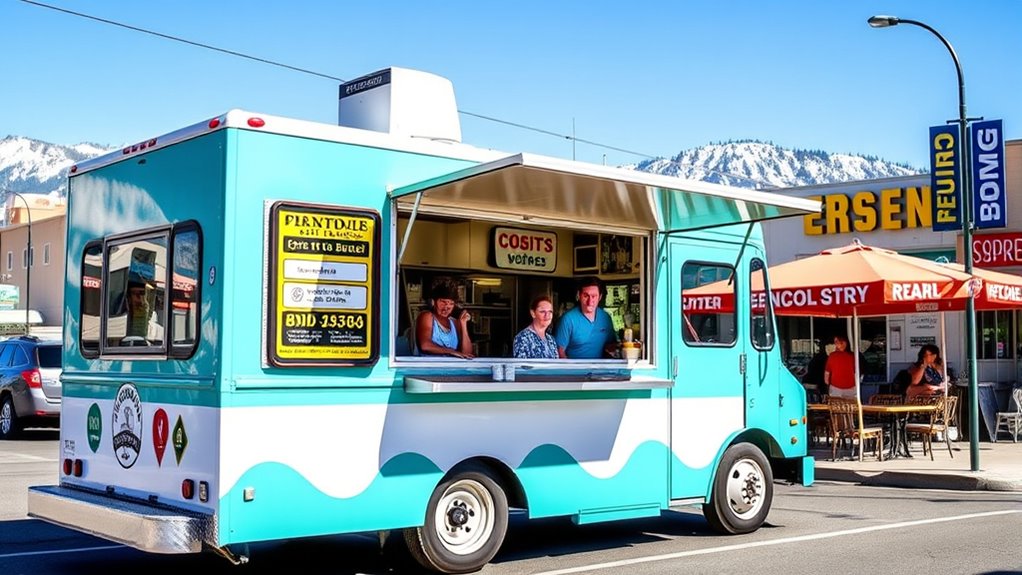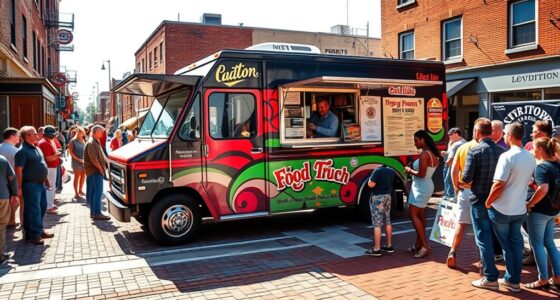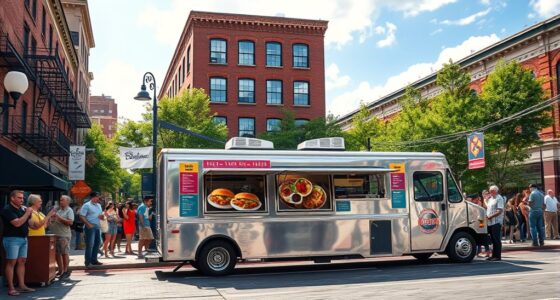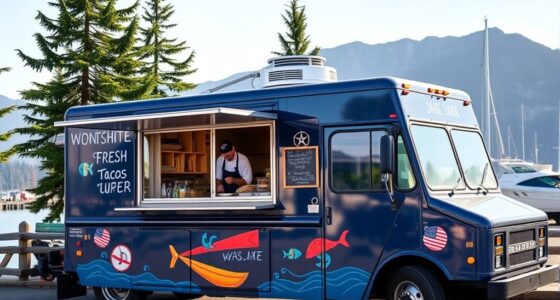To open a food truck in Bend, Oregon, you need to secure a Mobile Food Unit License from local health authorities, with costs ranging from $50,000 to $200,000 depending on your truck and equipment. Choose busy spots like breweries or parks, and develop a menu highlighting local ingredients and flavors that appeal to both locals and tourists. Effective marketing on social media and at events will boost your brand—stay with us to explore each step in detail.
Key Takeaways
- Secure a Mobile Food Unit License from Oregon Health Authority, with plan review and possible additional fire or zoning approvals.
- Budget between $50,000 and $200,000, covering truck costs, equipment, initial inventory, and operational expenses.
- Choose high-traffic, walkable locations near breweries, parks, or events like festivals for maximum visibility.
- Develop a menu featuring local ingredients, regional flavors, and seasonal options to attract both locals and tourists.
- Promote your food truck via social media, community events, sampling, and loyalty programs to build brand awareness and customer loyalty.
Navigating Permit and Licensing Requirements in Bend

To legally operate a food truck in Bend, Oregon, you must navigate a series of permit and licensing requirements. First, obtain a Mobile Food Unit License from the Oregon Health Authority or the local Environmental Health Department. This license confirms your compliance with food safety and health standards and is valid for one year, from January to December. If you plan to operate across multiple counties, notify the relevant health departments beforehand. Your application will include a plan review of your truck’s layout and operations. You may also need additional approvals from fire marshals or zoning authorities, depending on your location. Contact Deschutes County Environmental Services to guide you through the process, ensuring you meet all local health codes and requirements. The license is required to operate legally and avoid penalties. Additionally, understanding local zoning regulations can help you select suitable locations for your food truck and avoid compliance issues.
Estimating Costs and Budgeting for Your Food Truck Business

Estimating costs and creating a budget are key steps in launching your food truck business in Bend, Oregon. Startup costs typically range from $50,000 to $200,000, depending on whether you buy or lease a truck and the level of customization. Used trucks usually cost between $35,000 and $60,000, while new, customized trucks can exceed $150,000. Kitchen equipment installation may add $10,000 to $50,000, and initial inventory costs around $2,000 to $3,000. Licensing and permits can range from $500 to $5,000. Weekly operational costs, including supplies, fuel, and maintenance, generally total $500 to $2,000. Budget for insurance, safety compliance, marketing, and contingencies—aim for 10-15% of your startup costs—to guarantee a solid financial foundation.
Finding Prime Locations to Maximize Visibility and Sales
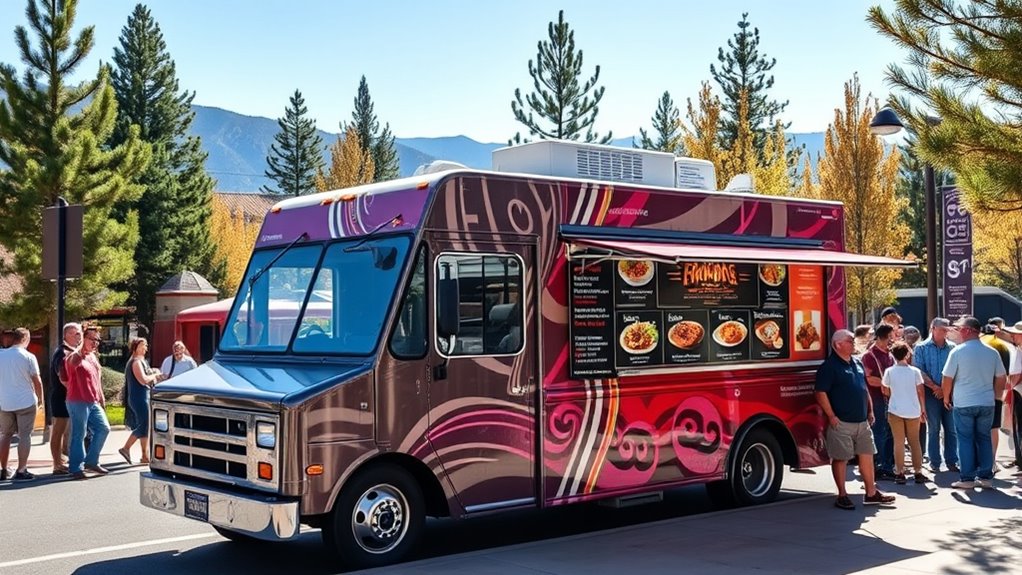
Finding the right location is vital for your food truck’s success in Bend, Oregon, as it directly influences visibility and sales. Prime spots like Silver Moon Brewing and The Podski attract lunchtime and after-work crowds by being close to downtown and popular breweries. Locations with large outdoor seating, amenities, and event spaces — such as On Tap or The Patio — encourage longer visits and group gatherings. High-traffic areas near hospitals, stadiums, or recreational spots boost foot traffic, especially during events or weekends. Walkability and parking are essential; spots with easy access and good visibility from main streets draw more customers. Partnering with breweries or hosting events can also increase exposure, helping your food truck stand out in Bend’s vibrant scene. Strategic placement during busy weekends and festivals can significantly increase customer flow, making it especially beneficial to position your truck where foot traffic peaks.
Crafting a Menu That Appeals to Local Tastes and Tourists

Crafting a menu that appeals to both locals and tourists requires understanding their unique tastes and preferences. To succeed, focus on bold, creative flavors that resonate with Bend’s food scene, like grilled meats, fresh seafood, and vegetarian options. Incorporate variety to attract tourists seeking diverse cuisines, such as barbecue, Mediterranean, or Asian dishes. Highlight local ingredients and regional flavors to create an authentic experience. Consider these key elements:
- Offer a mix of comfort foods, ethnic dishes, and signature creations to satisfy different palates.
- Pair menu items with regional craft beverages to enhance the dining atmosphere.
- Design for seasonality and outdoor dining, providing hearty options for winter and fresh, portable meals for summer.
Adding rustic decor elements can help reinforce the theme and attract customers seeking an authentic farm-to-table experience. Balancing local favorites with global influences ensures broad appeal and keeps your menu exciting year-round.
Effective Marketing Strategies to Grow Your Food Truck Brand
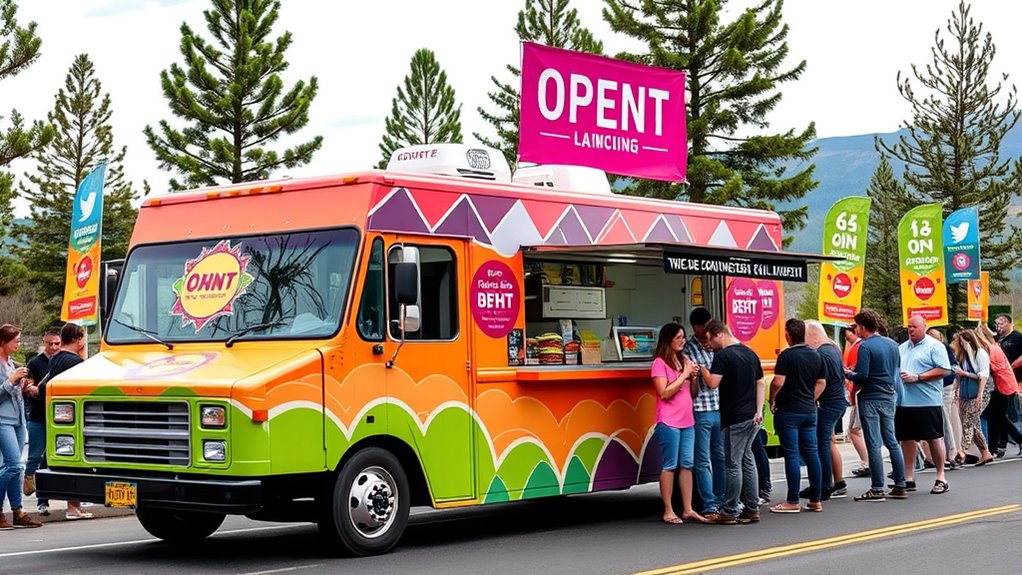
To successfully grow your food truck brand, implementing targeted marketing strategies is essential. Leveraging social media platforms like Facebook, used by 75% of food trucks, can boost your visibility and sales by around 20%. About 40% of customers discover trucks through social media ads, so maintain an active presence and engage followers with updates and specials. Participating in local festivals and community events (80% of trucks do this) increases brand awareness and foot traffic, while sampling menu items fosters loyalty. Incorporate loyalty and referral programs—over half of trucks do this—to encourage repeat visits and word-of-mouth growth. Using data analytics and digital tools to track customer preferences and location helps refine your messaging, making marketing efforts more effective and boosting your ROI. Digital tracking tools are used by 65% of food trucks to analyze customer data, enabling more targeted marketing and personalized offers. Recognizing the importance of digital literacy in modern marketing can help you better understand and utilize these online tools for your business.
Frequently Asked Questions
How Long Does the Permit Approval Process Typically Take in Bend?
You’re wondering how long it takes to get a permit approved in Bend. The process usually spans 3 to 6 months, depending on your trailer’s complexity and how quickly you submit complete documents. It includes plan reviews, inspections, and licensing. Working with experienced professionals can speed things up. Keep in mind, external factors like workload and delays may extend the timeline slightly, so plan accordingly.
Are There Specific Insurance Requirements for Food Trucks in Bend?
You need to meet specific insurance requirements to operate your food truck in Bend. This includes carrying commercial auto liability coverage with minimum limits of $25,000 per person and $50,000 per accident, along with general liability insurance to protect against claims for injury or property damage. If you serve alcohol, liquor liability insurance is also necessary. Providing proof of these coverages is essential for permits and event participation in Bend.
Can I Operate My Food Truck Year-Round in Bend’S Climate?
Thinking about operating your food truck year-round in Bend? You’ll need to weather the climate’s storm, literally. Cold winters with snow and lows down to -10°F pose challenges. To keep your business afloat, invest in good insulation, reliable heating, and adaptable schedules. While summer shines like gold, winter demands extra effort. With proper planning, you can navigate these seasonal swings and keep your truck rolling all year.
What Are Common Zoning Restrictions Affecting Food Truck Locations?
You need to understand zoning restrictions that impact your food truck’s location. Typically, food trucks are limited to commercial zones like C-2, C-3, C-4, and C-5, avoiding residential areas. You must also adhere to setback rules, usually 10-20 feet from streets, and avoid operating too close to brick-and-mortar restaurants. Permits, private property permissions, and parking regulations further influence where and when you can set up your truck.
How Do I Handle Health Inspections and Compliance Issues?
When handling health inspections and compliance issues, you should stay proactive by scheduling inspections and maintaining open communication with Deschutes County Environmental Health. Regularly perform self-checks using their guidelines, keep detailed records of training and sanitation efforts, and promptly address any violations identified. Ensuring your food truck operates according to approved plans and keeping all permits current helps prevent penalties and keeps your business running smoothly.
Conclusion
Starting your food truck in Bend isn’t just a venture—it’s your ticket to dominating the local food scene, turning heads, and becoming an unstoppable culinary force. With the right permits, a killer menu, prime spots, and savvy marketing, you’ll transform your truck into an iconic legend that everyone in town will rave about. Get ready to make waves, crush your competition, and turn your food truck dream into an unstoppable, mouthwatering empire!
